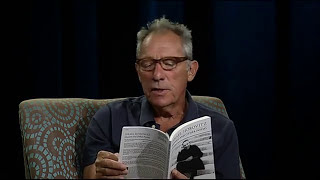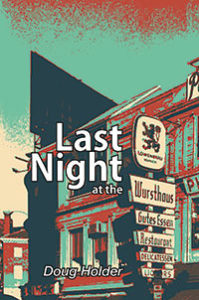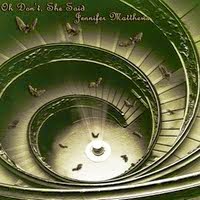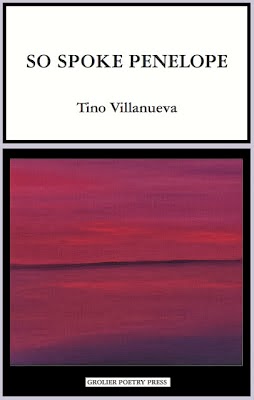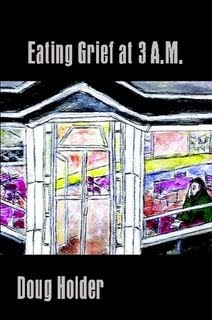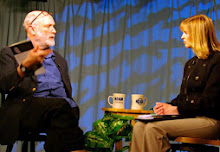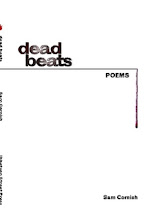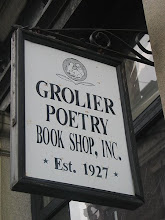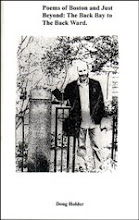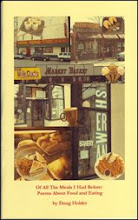M. Stefan Strozier: lives in New York City and is the artistic director of
La Muse Venale Acting Troupe. His plays: Guns, Shackles & Winter Coats, The Whales, The Tragedy of Abraham Lincoln (and the upcoming
The Green Game), were performed in lengthy runs, off-off Broadway, in the Midtown International Theatre Festival, and in other theaters. He has directed four plays and produced ten. His novels, short story collection, book of poems, essays, memoir, and plays are available for sale. His work has been published in many literary journals, online and in print. He is the chief editor and CEO of
World Audience, Inc., the publisher of quarterlies audience, The audience Review, and books by excellent writers from around the world.
Visit his 2nd blog. He also builds Web sites for very low prices. Please contact him:
strozier@worldaudience.org for further information.
M. Stefan Strozier : “Sit Down Before You Start to Read This!”
OVERVIEW by Hugh Fox
When I read Strozier’s latest (2007) book, The Tragedy of Abraham Lincoln: A Two-Act Play (no real-place address for the publisher, just www.worldaudience.org) I was totally taken back by its total seriousness. Effective dramatically, but at the same time like a documentary about Lincoln’s assassination by John Wilkes Booth. As I said in my review, “The Lincoln Strozier creates here is super-real, and Booth, his assassin, is just as real/human. No heroes versus monsters, but real-portraits of real-people in real-time.” I saw Strozier as some sort of super-academic, history-soaked genius who saw the world through extended visits to the rare (history) book room at major libraries, a kind of documentary re-creator of time-past. And it was in that frame-of-mind that I picked up his The Essays and Criticism of M. Stefan Strozier ,Vol.I (World Audience, Inc., 2006)) and started to read “An Interview with Kurt Vonnegut: and, Phone Call from Dr. Louis Manand, of The New Yorker Fame:” and the whole interview is one vast burlesque-ridicule of Vonnegut and big-time writing which Strozier sees as overly academic, library- 2.centered, out of touch with everyday reality. Look what he has Vonnegut saying about academics: “....In order to talk in an educated manner about literature, one has to be an English professor, like Doctor Louis Menand; and, have published several books; or, at least an MFA in creative writing, from somewhere like Columbia University, where all the geniuses are. You have not created anything because you are just writing merrily along, undisciplined...” (p.14) To which Strozier replies: “Your generation...defined writing as serving other professions, such as academia, journalism via New Journalism...everything; except, writing as an art form.....writing is an art, which owns all processes. Your generation’s art has been rejected, a failure!....Also, who says professors are right? My experience with professors -- notably English professors -- has always, always been that they have dubious talent, suspect motivations...and, no imagination, whatsoever....” (p.15) And so it goes, more like a wrestling match than an interview. Eventually I began wondering if the whole “interview” was for real. And it wasn’t. There’s a note at the very end: “Editor’s Note: The proceding “interview” is a work of fiction.” (p. 24) So where does reality begin and fantasy end? Or vice versa?
3. Like it’s a little difficult to take Strozier’s autobiography, The Labyrinth (World Audience, 2006) totally serious. The part about him being a young alcoholic totally lost and spinning around in an infinity of nothingness seems more like science fiction than autobiography. Here he is talking about his weltanshauung during alcohol-withdrawal: I lifted and turned my head to study the thick leather belts on my wrists and ankles....I rotate my body forcefully to the left and instantly dislocate my shoulder. I scream. No one answers. Now every time I move my shoulder I am in severe pain. To this day, my left should clicks if I pop it.... My personal demon is over my shoulder. He is The Smiler. He is the thin veil I use to hide my insanity from the world. He laughs with me, as we are going insane. He is the one who I am ashamed of when I see that my insanity is showing, and when I can’t stop laughing at the game going on in my head for hours, he is there. He is in the mirror, smiling at me.... Presences, as I call them; there are more of them. They are not alter-personalities because I still retain my own personality; but I drift into these other entities. The presences are not imaginary friends because they are real.... Voices in my head arrive: intense, stressful, simultaneously loudly speaking, as if I’m at a boisterous cocktail party: A snotty, high-pitched, female voice says, “Trees, 4. bebe somedee wee-hee. Low are the days in heaven and ghosts and be there where to doodoodoodoodoodoodoo- doodoodooand boom.” A rambling, sophisticated, male voice says, “I went to the sky and some time pass-ed and da my oh my and double youins be some dumb shitens and whore by the door score so there was still plenty of time so fine why not dine but then rickety picket the whicker chair’s picket tricket bliket me ticket me ticket! I simply must have me ticket! Young son, won’t you please get me the gun?” (pp. 13-18) It’s more than a little difficult to stop reading/quoting, isn’t it. Really crazy/hallucinogenic of just crazily inventive, you want to read on and on. And that’s the way everything Strozier writes is -- compelling, hypnotic, habit-forming. He’s like a drug himself, isn’t he. Stopping reading is like going through withdrawal. When I put it to Strozier today, a publisher-writer-producer totally on target, the soul of effectiveness in terms of the agonzing mechanics of contemporary publishing, writing and play-producing, here’s what he said: I think my story is that I just had to figure out what (not who) the hell I was (am), as it all hit me very hard, when I was very young. This took much work and creative thinking; however, once I had more or less nailed it, I then applied my (self) in unique ways to the normal world with much luck. The secret, that I realized later on, was that if I had had
5. no clue about what I was, then other people would be very much uncertain. Other people with similar problems may not be so lucky, however, and I hope my book can serve as one example, bold and bare as it stands. Not “who,” but “what” he was/is! And perhaps the work itself is a part of the “what-is” process! As I read through Strozier’s poetry and find all kinds of links with the wildest of French poets like Rimbaud, Mallarmé, Baudelaire, I can’t help but think that this whole process of self-awarenessing and defining is practically a normal process for all truly original creative artists: In wandering up to an overlook, Where the sky is clear and blue, And birds circle high in the air The city stretches into distance, Abated by treed hillsides I am welcomed here, By no one and nothing The river is to my left -- Strong, but barely discernable -- Behind me, there is a tourist castle. I smile at the secret I hold. (“The Heights,” from Schizophrenic Poetry, published by World Audience, 2006, p.24)
6. Very easy to imagine this translated into French, n’est pas? And what is the secret that he holds? So I asked him, and by return e-mail got a 643 page essay (I’m playing Strozier now, it was “only” 20!) on the use of the subconscious in the creative process in which he states that “the subconscious...rules nature and man,” and that when he discovered its importance he felt he had “unlocked the staircase to heaven.” Writing became “a powerful tool for exploring the ego and the subconscious because writing forces the mind to think, like an individual.” He wrote allowing the subconscious to take over: “There is no controlling the process; the process controls itself.” And I hate to say it but I agree with him, don’t consciously force what I’m writing on to the page, but listen to the voices inside me and put down what they are saying. And Strozier’s work has a strange hypnotic, compelling quality about it. Once you start reading his work, you can’t stop. He is the most habit-forming writer I have ever read. Take his novel about the Gulf War, for example, Scarecrow Soldier. You start to read about night attacks from the enemy, and Strozier is so graphic, terse, to the point, so overwhelmingly realistic, that, I ask you, can you stop reading?
7. The air attacks came every night, never letting up, always worse than the night before. Things never got better, not even for a moment. Every soldier knew the routine they had to follow. They knew how long it would take before they might meet Great Allah. In the darkness, the wraiths of men wrapped their lanky arms around their thin, bony knees. Large white eyes flickered from terror in the cold, pitch black bunkers like muttered muttered incoherent sentences about things “precious” to them...the numbness of the chill reached down to the souls of the soldiers. The desert cold ate into their skin and their blood and then like a wet blanket, it pressed down on them, seepling slowly into their bones like lead. The cold had a way of weighing a mind down and burdening it. First the low, steady hum from the enemies’ B-52’s came unmistakably into the ears of the soldiers in the bunkers...... (Scarecrow Soldier, Chapter Two, “Scarecrow of a Man,” p.22) World Audience,Inc., 1992). You see what I mean? It’s narrative reduced not only to its basic, no-nonsenseness, but with little personal, subjective touches thrown in, references to Allah, the bunkers talking, nothing really literarywise “thought out,” but allowed to “come out” of the creative subconscious mind in a sense dictating the whole work. Strozier is very aware of exactly where he and his mode of
8.functioning stands in the publishing world that surrounds him in New York. And he enjoys being a total outsider, with his own publishing business has begun a whole new , alternative publishing universe. But back to his work itself. The Whales is one of the funniest, strangest, and most cogent/penetrating plays ever written. A whale on the cover. The play partly about whales/whale-choruses in a way, but what it’s really about is the mystique of the contemporary NYC publishing/drama-producing world. Toward the end, with the whales and whale chorus standing by, a character named Harry (Strozier himself?) comes out with one of the most to-the-point monologues ever written: We all want toi fall in love with it again. We want our theaters to have emotion, not attend a lecture. We want real characters we understand and love and hate. We want to get angry at our characters and cry with them. We want our theater back. $150 is too much to pay for a ticket. Add in the roses for the lady, drinks;and, parking and you are set back two to three yards -- hundreds of dollars....our feelings and our desires are more important than lining a producer’s pocket with money. We want control. We want our theater back. Our theater does not belong to tourists or the mayor. Our theater belongs to us!... (The Whales: A Comedy in Seven Scenes, p.43,World Audience, Inc., 2006,originally performed by La Muse Vénal, Inc. at Where Eagles Dare Theater in NYC, Jan., 2006).
9. Strozier is a writer, publisher, play-producer to keep your eye on. Amazing energy, a fanatic sense of purpose/direction, and always that sense that the “real” him is at work, not some sort of societally-engineered individual, but a man totally in touch with his own inner realities that drive him forcefully through the world that (oft-times negatively) surrounds him.





